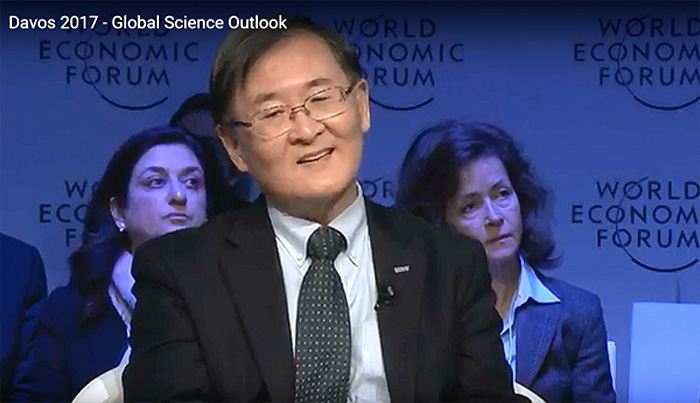people

President Sung-Mo Kang of KAIST participated in the World Economic Forum’s Annual Meeting January 17-20, 2017 in Davos, Switzerland.
On January 20, President Kang joined the Arena discussion on the outlook of global science in the year ahead with a group of distinguished scientists, including the Director of the US National Science Foundation, France A. Córdova, and the Editor-in-Chief of Nature, Philip Campbell.
Under Dr. Campbell’s moderation of the session, the panelists introduced their perspectives on 2017 and engaged in free discussions among themselves and with the audience.
President Kang began his talks on four major technological trends that have caught much of our attention in recent years, which he called “ICBM.” The “I” stands for the Internet of Things (IoT), “C” for cloud computing, “B” for brain, in other words, cognitive computer science such as artificial intelligence, and “M” for mobile technology that has been widely applied to unmanned ground vehicles and drones.
He noted the emergence of brain research as one of the most exciting fields in the coming years, and accordingly, we will learn more about its functions and develop promising results in treating brain-related diseases, i.e., a nanoscale memory chip being inserted into a patient suffering from dementia for targeted therapy.
President Kang also mentioned the role of higher education in the era of the Fourth Industrial Revolution, for example, how to foster scientists and engineers to responsibly meet with the challenges anticipated in today’s rapidly changing technological environments. He said that robots would replace many jobs, and it is important to come up with real solutions for such changes.
Lastly, President Kang stressed that the scientific community should continue its efforts to communicate with the public, accurately informing them of key scientific issues and offering opportunities to hold public discussions and debates that have greater influence over society. He presented a case of Korea’s latest outbreaks of Avian Influenza that resulted in destroying hundreds of thousands of infected chickens to prevent the spread of the disease, and highlighted the need for maintaining a strong communication channel between science and the public.
The full list of the participating panelists included Sung-Mo Steve Kang, President, KAIST; Marc N. Casper, President and Chief Executive Officer, Thermo Fisher Scientific, USA; France A. Córdova, Director of the National Science Foundation (NSF), USA; and Fabiola Gianotti, Director General of the European Organization for Nuclear Research (CERN), Geneva, Switzerland.
To watch the entire discussion, please go to https://www.youtube.com/watch?v=bF-joYnyYa0.
-
research KAIST sends out Music and Bio-Signs of Professor Kwon Ji-yong, a.k.a. G-Dragon, into Space to Pulsate through Universe and Resonate among Stars
KAIST (President Kwang-Hyung Lee) announced on the 10th of April that it successfully promoted the world’s first ‘Space Sound Source Transmission Project’ based on media art at the KAIST Space Research Institute on April 9th through collaboration between Professor Jinjoon Lee of the Graduate School of Culture Technology, a world-renowned media artist, and the global K-Pop artist, G-Dragon. This project was proposed as part of the ‘AI Entertech Research Center’ be
2025-04-10 -
event KAIST, Galaxy Corporation Hold Signboard Ceremony for ‘AI Entertech Research Center’
KAIST (President Kwang-Hyung Lee) announced on the 9th that it will hold a signboard ceremony for the establishment of the ‘AI Entertech Research Center’ with the artificial intelligence entertech company, Galaxy Corporation (CEO Yong-ho Choi) at the main campus of KAIST. < (Galaxy Corporation, from center to the left) CEO Yongho Choi, Director Hyunjung Kim and related persons / (KAIST, from center to the right) Professor SeungSeob Lee of the Department of Mechanical Engineer
2025-04-09 -
research KAIST Identifies Master Regulator Blocking Immunotherapy, Paving the Way for a New Lung Cancer Treatment
Immune checkpoint inhibitors, a class of immunotherapies that help immune cells attack cancer more effectively, have revolutionized cancer treatment. However, fewer than 20% of patients respond to these treatments, highlighting the urgent need for new strategies tailored to both responders and non-responders. KAIST researchers have discovered that 'DEAD-box helicases 54 (DDX54)', a type of RNA-binding protein, is the master regulator that hinders the effectiveness of immunotherapy—opening
2025-04-08 -
research KAIST Develops Retinal Therapy to Restore Lost Vision
Vision is one of the most crucial human senses, yet over 300 million people worldwide are at risk of vision loss due to various retinal diseases. While recent advancements in retinal disease treatments have successfully slowed disease progression, no effective therapy has been developed to restore already lost vision—until now. KAIST researchers have successfully developed a novel drug to restore vision. < Photo 1. (From left) Ph.D. candidate Museong Kim, Professor Jin Woo Kim, a
2025-03-31 -
research KAIST provides a comprehensive resource on microbial cell factories for sustainable chemical production
In silico analysis of five industrial microorganisms identifies optimal strains and metabolic engineering strategies for producing 235 valuable chemicals Climate change and the depletion of fossil fuels have raised the global need for sustainable chemical production. In response to these environmental challenges, microbial cell factories are gaining attention as eco-friendly platforms for producing chemicals using renewable resources, while metabolic engineering technologies to enhance these
2025-03-27